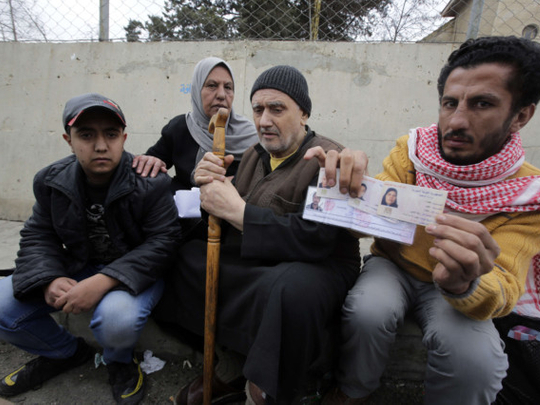
Baddawi Refugee Camp, Lebanon: Umm Khalid’s living room in the Baddawi refugee camp in north Lebanon is now a bedroom for Palestinians fleeing fierce battles in another refugee camp — in the Syrian capital.
“Twenty people from Yarmuk [in Damascus] arrived at my house, among them children, women and elderly people” on Monday, said Khalid, 50, herself a long-time Palestinian resident of Baddawi.
“The living room has been turned into a bedroom. There’s no room to sit. There are mattresses even in the corridor,” said Umm Khalid who already hosts another 40 refugees.
Tens of thousands of residents of the Yarmuk camp in southern Damascus have fled since fighting erupted there between Syrian rebels and their Palestinian allies, and Palestinian factions still loyal to the regime in Damascus.
The United Nations Relief and Works Agency (UNRWA) said at least half of Yarmuk’s population of more than 112,000 had fled the violence rocking the 2.1 square-kilometre camp.
Since the weekend, more than 2,000 Palestinians from Yarmuk are estimated to have fled into neighbouring Lebanon.
Nearly 70 families have arrived at Baddawi and at the Nahr Al Bared camp over the past two days, said Rabih Damess who heads a Lebanese-Palestinian refugee committee.
“The situation of these families is disastrous. Most left all their belongings behind when they fled their homes.”
Lebanon’s 12 official Palestinian camps are “the worst in the region,” according to an international organisation, but they have still provided a haven for thousands of refugees from the escalating violence in Syria.
“I am sharing a single room with six Palestinian families from Syria. There’s around 50 of us. I fled Yarmuk with my children, but my husband stayed behind,” said Umm Ahmad, 45, who arrived in Baddawi on Monday.
She said she left her home in Yarmuk after “armed men” told her and others to leave.
“We left and we took a bus to the Syrian border with Lebanon. We saw hundreds of families waiting to cross the frontier,” said Umm Amr, 35, another refugee.
Khalid Al Shaikh, 65, saw “hundreds of armed men carrying the opposition flag and Islamist banners” in Yarmuk as he fled with his wife, daughter and grandchildren.
“But my young son stayed behind,” he said, adding that he has not heard from him since they left the camp.
For many of these shocked Palestinians it is a painful journey, reminding them what their ancestors experienced 64 years ago in the violence that erupted after the creation of the state of Israel.
“Our motto now is no longer a return to Palestine, but to Yarmuk,” said 35-year-old Amna.
UNRWA, short of funds, housing and basic foodstuffs, is also struggling to cope with the influx in Lebanon, said spokeswoman Hoda Samra, but added that refugees had access to its clinics and schools in camps such as Baddawi.
Like other organisations working with Palestinians in Lebanon, UNRWA has distributed coupons so refugees can buy clothes to help cope with the bitter cold of winter.
But describing the situation as “catastrophic,” Samra said her agency has received just $760,000 (Dh279,169) of the $8.2 million that it needs to help the “10,000 Palestinians who have arrived in Lebanon in recent months” from Syria.












